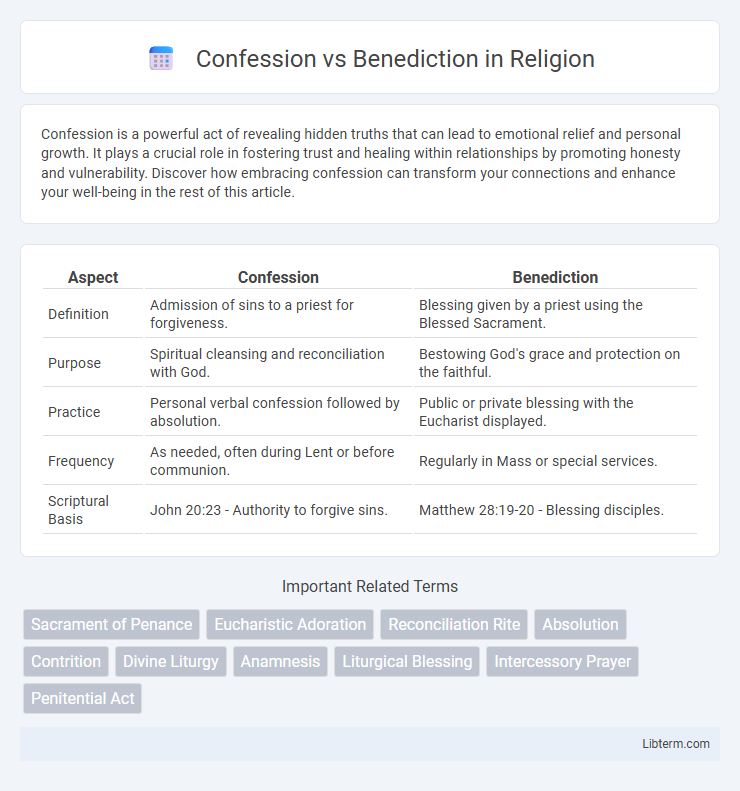Confession is a powerful act of revealing hidden truths that can lead to emotional relief and personal growth. It plays a crucial role in fostering trust and healing within relationships by promoting honesty and vulnerability. Discover how embracing confession can transform your connections and enhance your well-being in the rest of this article.
Table of Comparison
| Aspect | Confession | Benediction |
|---|---|---|
| Definition | Admission of sins to a priest for forgiveness. | Blessing given by a priest using the Blessed Sacrament. |
| Purpose | Spiritual cleansing and reconciliation with God. | Bestowing God's grace and protection on the faithful. |
| Practice | Personal verbal confession followed by absolution. | Public or private blessing with the Eucharist displayed. |
| Frequency | As needed, often during Lent or before communion. | Regularly in Mass or special services. |
| Scriptural Basis | John 20:23 - Authority to forgive sins. | Matthew 28:19-20 - Blessing disciples. |
Understanding Confession: Definition and Purpose
Confession is the act of acknowledging sins or wrongdoings to seek forgiveness and spiritual cleansing, central to many religious practices. Its primary purpose is to foster repentance, restore the relationship between the individual and the divine, and promote personal accountability. Confession facilitates inner healing and moral growth by confronting guilt and encouraging sincere contrition.
What is Benediction? Meaning and Significance
Benediction is a solemn blessing typically given at the end of a religious service to invoke divine favor and protection upon the congregation. It holds significant importance in Christian liturgy as a form of sending forth, symbolizing God's grace and peace. Unlike confession, which focuses on repentance and forgiveness, benediction emphasizes spiritual encouragement and divine presence.
Historical Roots: Confession and Benediction in Christianity
Confession in Christianity traces back to early Church practices where penitents publicly acknowledged sins before clergy, rooted in biblical passages such as James 5:16 emphasizing mutual confession for spiritual healing. Benediction, developing from medieval Eucharistic adoration, involves the blessing of the congregation with the Blessed Sacrament, symbolizing Christ's presence and grace. Both rites evolved to reinforce divine forgiveness and communal faith, reflecting distinct theological emphases within Christian liturgy and pastoral care.
Key Rituals: Process and Practice Compared
Confession involves verbally admitting sins to a priest, followed by an act of contrition and absolution, emphasizing repentance and forgiveness within a sacramental framework. Benediction consists of the solemn blessing given by a priest using the Blessed Sacrament displayed in a monstrance, focusing on adoration and divine grace. The key ritual difference lies in confession's restorative intent through verbal acknowledgment, while benediction centers on silent worship and the imparting of blessings.
Theological Differences: Confession vs Benediction
Confession involves acknowledging sins before God, seeking forgiveness and spiritual cleansing, emphasizing human repentance and God's mercy. Benediction, often a blessing pronounced by a clergy member, focuses on invoking divine favor, peace, and protection without direct reference to sin or repentance. Theologically, confession centers on reconciliation and grace through contrition, while benediction emphasizes divine presence and encouragement for the faithful.
Spiritual Benefits of Confession
Confession offers profound spiritual benefits by fostering self-awareness, repentance, and renewed grace, which strengthens the believer's relationship with God. It provides emotional healing through the release of guilt and the experience of divine forgiveness, promoting inner peace and spiritual growth. Regular confession supports moral accountability and cultivates humility, enhancing one's commitment to live a virtuous and faithful life.
Spiritual Power of Benediction
Benediction carries profound spiritual power, serving as a divine blessing that imparts grace, protection, and peace to believers. Unlike confession, which involves acknowledging and repenting for sins, benediction actively channels God's favor and empowerment for spiritual growth and renewal. This sacred pronouncement fosters a transformative connection between the individual and the divine, reinforcing faith and encouraging a holy life.
Confession and Benediction in Modern Worship
Confession in modern worship serves as a critical moment for believers to acknowledge personal sins and seek forgiveness, fostering spiritual growth and communal honesty. Benediction, typically a solemn blessing at the end of a service, reinforces God's presence and peace, preparing congregants to carry faith into daily life. Both elements emphasize the transformative power of grace, underscoring a cycle of repentance and divine reassurance central to contemporary worship practices.
Common Misconceptions Clarified
Confession and benediction are often misunderstood as opposing practices, but confession involves acknowledging sins to seek forgiveness, while benediction is a blessing that imparts grace and peace. Common misconceptions confuse confession solely with guilt or punishment, whereas it is a sacrament of healing and reconciliation in many Christian traditions. Benediction is frequently mistaken for a formal ritual only for clergy, yet it serves to unite and inspire the entire congregation by invoking divine favor.
Choosing the Right Practice: When and Why
Choosing between Confession and Benediction depends on the spiritual needs and liturgical context; Confession offers a sacramental opportunity for repentance and forgiveness of sins, fostering personal humility and renewal. Benediction, as a devotional practice involving the blessing with the Blessed Sacrament, provides a moment of grace and adoration, ideal for deepening faith and receiving spiritual consolation. Understanding the distinct purposes of Confession for cleansing the soul and Benediction for honoring Christ in the Eucharist guides the appropriate timing and intent for each practice.
Confession Infographic

 libterm.com
libterm.com